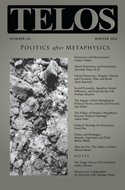Adrian Pabst’s “The Politics of Paradox: Metaphysics beyond ‘Political Ontology'” appears in Telos 161 (Winter 2012). Read the full version online at the Telos Online website, or purchase a print copy of the issue in our store.
 Since the onset of the Enlightenment, much of modern thought has celebrated the end of metaphysics and the death of God. The project of “political ontology,” which combines post-metaphysical with post-theistic thinking, underpins the scientific rationalism that pervades contemporary philosophy and politics. Faced with the secular slide into skepticism, relativism, and nihilism, this essay argues that the only genuine alternative to “political ontology” is a metaphysical politics of paradox. Philosophically, modernity and postmodernity invented and intensified the onto-theological science of transcendental ontology that can be traced to Scotus, Ockham, Machiavelli, and Suárez. They bequeathed three currents—possibilism, transcendentalism, and absolutism—that flow through figures such as Descartes, Wolff, and Clauberg to Kant, Hegel, and Comte.
Since the onset of the Enlightenment, much of modern thought has celebrated the end of metaphysics and the death of God. The project of “political ontology,” which combines post-metaphysical with post-theistic thinking, underpins the scientific rationalism that pervades contemporary philosophy and politics. Faced with the secular slide into skepticism, relativism, and nihilism, this essay argues that the only genuine alternative to “political ontology” is a metaphysical politics of paradox. Philosophically, modernity and postmodernity invented and intensified the onto-theological science of transcendental ontology that can be traced to Scotus, Ockham, Machiavelli, and Suárez. They bequeathed three currents—possibilism, transcendentalism, and absolutism—that flow through figures such as Descartes, Wolff, and Clauberg to Kant, Hegel, and Comte.


